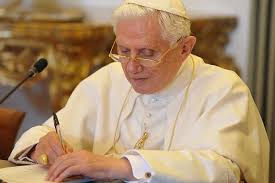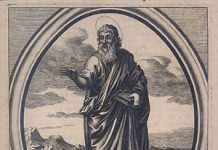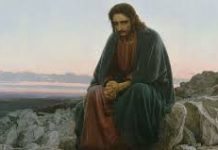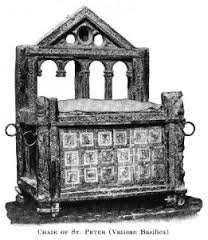(On this twentieth anniversary of the death of Pope Saint John Paul II, here is the beautiful funeral homily of Cardinal Josef Ratzinger, who may have had some premonition that he may be elected to succeed his friend and mentor. May their legacy live forever, and may their prayers and intercession help reform the Church now in such need. Editor).
FUNERAL MASS
OF THE ROMAN PONTIFF
JOHN PAUL II
HOMILY OF HIS EMINENCE CARD. JOSEPH RATZINGER
St Peter’s Square
Friday, 8 April 2005
“Follow me. ” The Risen Lord says these words to Peter. They are his last words to this disciple, chosen to shepherd his flock. “Follow me” – this lapidary saying of Christ can be taken as the key to understanding the message which comes to us from the life of our late beloved Pope John Paul II. Today we bury his remains in the earth as a seed of immortality – our hearts are full of sadness, yet at the same time of joyful hope and profound gratitude.
These are the sentiments that inspire us, Brothers and Sisters in Christ, present here in Saint Peter’s Square, in neighbouring streets and in various other locations within the city of Rome, where an immense crowd, silently praying, has gathered over the last few days. I greet all of you from my heart. In the name of the College of Cardinals, I also wish to express my respects to Heads of State, Heads of Government and the delegations from various countries. I greet the Authorities and official representatives of other Churches and Christian Communities, and likewise those of different religions. Next I greet the Archbishops, Bishops, priests, religious men and women and the faithful who have come here from every Continent; especially the young, whom John Paul II liked to call the future and the hope of the Church. My greeting is extended, moreover, to all those throughout the world who are united with us through radio and television in this solemn celebration of our beloved Holy Father’s funeral.
Follow me – as a young student Karol Wojtyła was thrilled by literature, the theatre, and poetry. Working in a chemical plant, surrounded and threatened by the Nazi terror, he heard the voice of the Lord: Follow me! In this extraordinary setting he began to read books of philosophy and theology, and then entered the clandestine seminary established by Cardinal Sapieha. After the war he was able to complete his studies in the faculty of theology of the Jagiellonian University of Kraków. How often, in his letters to priests and in his autobiographical books has he spoken to us about his priesthood, to which he was ordained on 1 November 1946. In these texts he interprets his priesthood with particular reference to three sayings of the Lord. First: “You did not choose me, but I chose you. And I appointed you to go and bear fruit, fruit that will last” (Jn 15:16). The second saying is: “The good shepherd lays down his life for the sheep” (Jn 10:11). And then: “As the Father has loved me, so I have loved you; abide in my love” (Jn 15:9). In these three sayings we see the heart and soul of our Holy Father. He really went everywhere, untiringly, in order to bear fruit, fruit that lasts. “Rise, Let us be on our Way!” is the title of his next-to-last book. “Rise, let us be on our way!” – with these words he roused us from a lethargic faith, from the sleep of the disciples of both yesterday and today. “Rise, let us be on our way!” he continues to say to us even today. The Holy Father was a priest to the last, for he offered his life to God for his flock and for the entire human family, in a daily self-oblation for the service of the Church, especially amid the sufferings of his final months. And in this way he became one with Christ, the Good Shepherd who loves his sheep. Finally, “abide in my love:” the Pope who tried to meet everyone, who had an ability to forgive and to open his heart to all, tells us once again today, with these words of the Lord, that by abiding in the love of Christ we learn, at the school of Christ, the art of true love.
Follow me! In July 1958 the young priest Karol Wojtyła began a new stage in his journey with the Lord and in the footsteps of the Lord. Karol had gone to the Masuri lakes for his usual vacation, along with a group of young people who loved canoeing. But he brought with him a letter inviting him to call on the Primate of Poland, Cardinal Wyszyński. He could guess the purpose of the meeting: he was to be appointed as the auxiliary Bishop of Kraków. Leaving the academic world, leaving this challenging engagement with young people, leaving the great intellectual endeavour of striving to understand and interpret the mystery of that creature which is man and of communicating to today’s world the Christian interpretation of our being – all this must have seemed to him like losing his very self, losing what had become the very human identity of this young priest. Follow me – Karol Wojtyła accepted the appointment, for he heard in the Church’s call the voice of Christ. And then he realized how true are the Lord’s words: “Those who try to make their life secure will lose it, but those who lose their life will keep it” (Lk 17:33). Our Pope – and we all know this – never wanted to make his own life secure, to keep it for himself; he wanted to give of himself unreservedly, to the very last moment, for Christ and thus also for us. And thus he came to experience how everything which he had given over into the Lord’s hands came back to him in a new way. His love of words, of poetry, of literature, became an essential part of his pastoral mission and gave new vitality, new urgency, new attractiveness to the preaching of the Gospel, even when it is a sign of contradiction.
(To continue reading, please see here)












